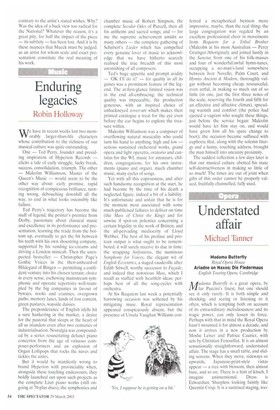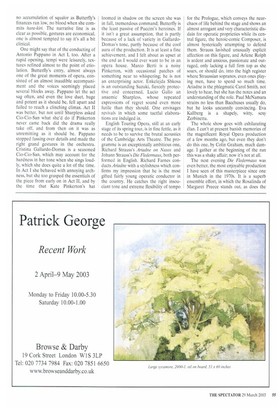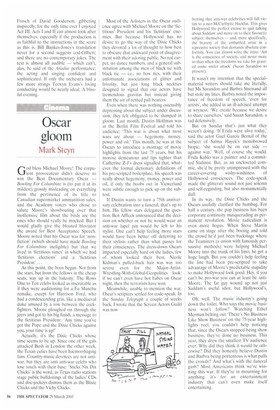Understated affair
Michael Tanner
Madam Butterfly Royal Opera House Ariadne on Naxos; Die Fledermaus English Touring Opera, Cambridge
Madama Butterfly is a great opera, by far Puccini's finest, but one should see it only rarely. It is both simple and shocking, and seeing or listening to it often, which is tempting both on account of its extraordinary melodiousness and its tragic power, can only lessen its force. Perhaps with that in mind the Royal Opera hasn't mounted it for almost a decade, and now it arrives in a new production by Moshe Leiser and Patrice Caurier, with sets by Christian Fenouillat. It is an almost sensationally straightforward, understated affair. The stage has a small table, and sliding screens. When they move, sideways or
upwards, Japanese-print-style vistas appear — a tree with blossom, then almost bare, and so on. There is a hint of kitsch, I imagine unintentional. Dress is Edwardian, Sharpless looking faintly like Quentin Crisp. It is a sanitised staging, too:
no accumulation of squalor as Butterfly's finances run low, no blood when she commits hara-kiri. The narrative line is as clear as possible, gestures are economical, one is almost tempted to say it's all a bit clinical.
One might say that of the conducting of Antonio Pappano in Act I, too. After a rapid opening, tempi were leisurely, textures refined almost to the point of etiolation. Butterfly's entry, almost always one of the great moments of opera, consisted of an almost inaudible accompaniment and the voices seemingly placed several blocks away. Pappano let the act sag often, and even the love duet, huge and potent as it should be, fell apart and failed to reach a clinching climax. Act II was better, but not until Sharpless asked Cio-Cio-San what she'd do if Pinkerton never came back did the drama really take off, and from then on it was as unremitting as it should be. Pappano stopped fussing over details and made the right grand gestures in the orchestra. Cristina Gallardo-Domas is a seasoned Cio-Cio-San, which may account for the hardness in her tone when she sings loudly, which she does quite a lot of the time. In Act I she behaved with annoying archness, but she too grasped the essentials of the piece from early on in Act II, and by the time that Kate Pinkerton's hat loomed in shadow on the screen she was in full, tremendous command; Butterfly is the least passive of Puccini's heroines. If it isn't a great assumption, that is partly because of a lack of variety in GallardoDomas's tone, partly because of the cool aura of the production. It is at least a fine achievement, and I felt about as upset at the end as I would ever want to be in an opera house. Marco Berti is a noisy Pinkerton, with occasional patches of something near to whispering; he is not an enterprising actor, Enkelejda Shkosa is an outstanding Suzuki, fiercely protective and concerned, Lucio Gallo an anaemic Sharpless, whose repeated expressions of regret sound even more futile than they should. One envisages revivals in which some tactful elaborations are indulged in.
English Touring Opera, still at an early stage of its spring tour, is in fine fettle, as it needs to be to survive the brutal acoustics of the Cambridge Arts Theatre. The programme is an exceptionally ambitious one, Richard Strauss's Ariadne on Naxos and Johann Strauss's Die Fledermaus, both performed in English. Richard Fames conducts Ariadne with a stylishness which confirms my impression that he is the most gifted fairly young operatic conductor in the country. He catches the right insouciant tone and extreme flexibility of tempo
for the Prologue, which conveys the nearchaos of life behind the stage and shows an almost arrogant and very characteristic disdain for operatic proprieties while its central figure, the heroic-comic Composer, is almost hysterically attempting to defend them. Strauss lavished unusually explicit affection on this figure, and Arlene Rolph is ardent and anxious, passionate and outraged, only lacking a full firm top as she soars, or should do, into the high register where Straussian sopranos, even ones playing men, have to spend so much time. Ariadne is the phlegmatic Carol Smith, not lovely to hear, but she has the notes and an understanding of the role. Paul McNamara strains no less than Bacchuses usually do, but he looks uncannily convincing. Eva Kallberg is a shapely, witty, sexy Zerbinetta.
The whole show goes with exhilarating élan. I can't at present banish memories of the magnificent Royal Opera production of a few months ago, but even they don't do this one, by Colin Graham, much damage. I gather at the beginning of the run this was a shaky affair; now it's not at all.
The next evening Die Fledennaus was even better, the most enjoyable production I have seen of this masterpiece since one in Munich in the 1970s. It is a superb ensemble effort, in which the Rosalinda of Margaret Preece stands out, as does the
Frosch of David Gooderson, gibbering inspiredly; for the only time ever I enjoyed Act III. Acts I and II can almost look after themselves, especially if the production is as faithful to the instructions in the score as this is. Bill Bankes-Jones's translation never for a second suggests cod-Gilbert; and there are no contemporary jokes. The text is almost all audible which can't, alas, be said of the Ariadne performance; the acting and singing confident and sophisticated. If only the orchestra had a few more strings Tecwyn Evans's loving conducting would be nearly ideal. A blissful evening.










































































 Previous page
Previous page